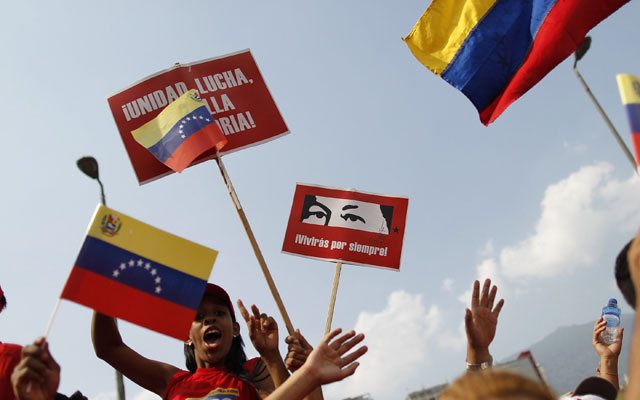Venezuela Presidential Election: Continuing the Chavez Decline
Ray Walser /
Voters go to the polls on Sunday, April 14, to elect Venezuela’s next president. Snap elections followed the March 5 death of the authoritarian populist Hugo Chavez.
It appears likely that voters will choose Nicolas Maduro, interim president, and Chavez’s handpicked successor, over opposition candidate Henrique Capriles. A dying Chavez defeated Capriles on October 7, 2012, by over 10 percentage points in an unfair election, and current polling gives Maduro the apparent advantage going into the elections.
Since El Commandante’s death, Maduro has campaigned on Chavez’s legacy and on the largess he bestowed upon his people. Images, videos, and publicity glorifying the deceased leader saturate every aspect of the electoral conversation—crowding out serious debate about Venezuela’s political, economic, and foreign policy future.
A Maduro victory will place enormous executive power in the hands of an untried, charismatically challenged leader whose most recent pronouncements have included claims that he was in the presence of Chavez’s departed spirit, invoking ancient curses, and a fresh frenzy of anti-Americanism. Support for Maduro comes from the base of the regime’s clients and beneficiaries, an opaque inner circle, an often corrupt military arm, and the Castro regime in Havana.
With Maduro at the helm, Venezuelans will have good cause to worry about their future. The economic storm clouds on the horizon are increasingly menacing. Yet, Maduro appears committed to preserving what Chavez biographer Rory Carroll described recently as “moneyed dysfunction.”
Maduro has no plan for addressing horrific crime rates, profligate subsidies, galloping inflation, or the disastrous loss of economic freedom. Reversing Venezuela’s growing addiction to imports from food to luxury items, declining productivity, and increasing indebtedness appear well beyond his capacity. New anti–private sector laws will only make things worse.
The most likely scenario after April 14 is a continuous erosion of individual rights, rising tensions within the ranks of the Chavistas, and a socialist-induced economic crisis that will likely propel this oil-rich nation of 30 million into an increasing spiral of rancor, polarization, economic malfeasance, and potential instability. The tears shed in mourning for the death of El Commandante will eventually become tears shed for the decline and disorder of an entire nation.
Welcome to Venezuela’s new abnormal.

